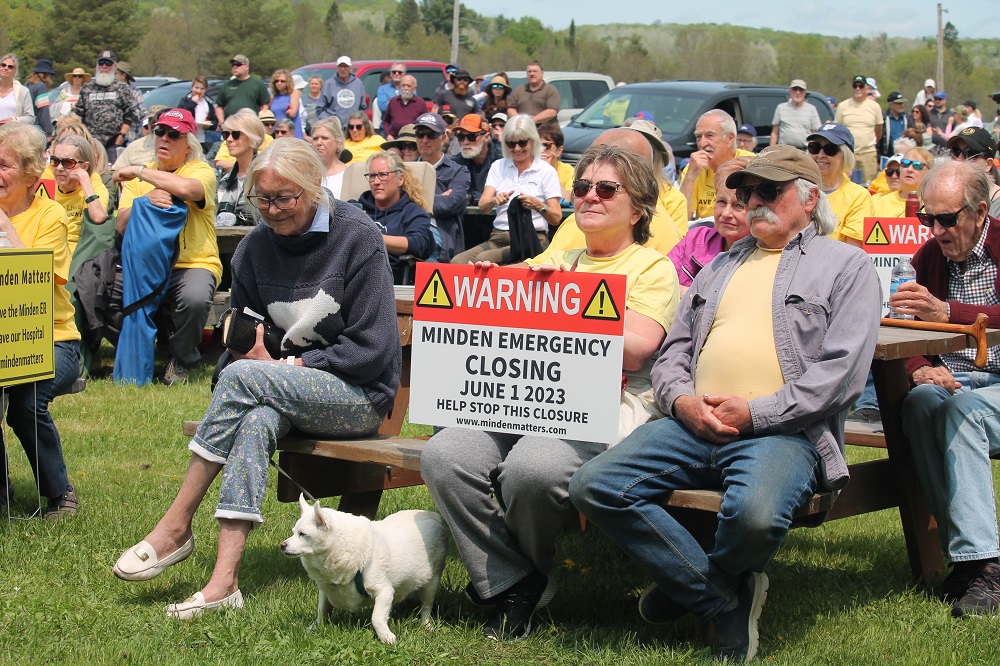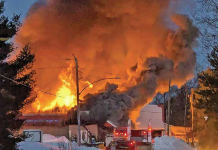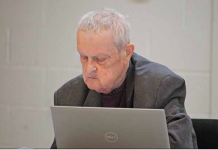Haliburton Highlands Health Services (HHHS) is going to spend more money for less service and still be at risk of an emergency room closure under its consolidation plan, Minden ER lead, Dr. Bruno Helt, says.
In a May 18 interview, Dr. Helt said going to one ER, from two, obviously means less service.
He added despite HHHS CEO Carolyn Plummer saying consolidating to Haliburton will lessen the risk of a temporary ER closure, he’s not convinced.
As the scheduler of the Minden ER department, he said they had doctors signed up until the end of September and it was never at risk of closing this summer – unless the Haliburton ER were to close, in which the Minden ER doctors would not be able to safely handle the overflow of patients.
Dr. Helt said Plummer told County council at a May 16 meeting HHHS was in a similar staffing position at this time last year going into summer. He added that is when the prospect of short-notice, temporary closures was raised. If Haliburton is in a similar staffing position leading up to the June 1 consolidation, he is worried HHHS will be unable to fill all doctor shifts. The health care organization has already stated it is understaffed for June, July and August, though Plummer expressed confidence all shifts will be filled.
Plummer said on May 23, “HHHS is now in a better situation for physician staffing in the month of June than we were at this time last year. The anticipated temporary closures were as a result of nursing staff shortages. With the consolidation, HHHS has been able to adjust the nursing staff schedule to better match anticipated patient volumes, which decrease in the overnight hours. This will help to reduce the risk of temporary, shortnotice, unpredictable closures that would have had a significant negative impact on the community.”
Dr. Helt also thinks staffing will come at a premium, with doctors being incentivized to come to Haliburton. He further confirmed his Minden ER group will have to be paid out of their contracts. “They broke the contract for us. We’re supposed to have a 90-day notification period. They gave us six weeks.” Dr. Helt said it is not a consolidation of two hospitals and two physician groups since his doctors are not going to Haliburton
“It’s basically the Haliburton group still in a very vulnerable position, where they have to cover lots of shifts and Health Force is going be required to cover whatever they can’t, and Carolyn said that at the meeting, they’re working with Health Force, but it’s never a certainty.”
He noted they will be going from 60 to 90 shifts a month in Haliburton.
Dr. Helt went on to say, “I don’t see why it had to happen before the summer. I do believe it would have been better to happen after the summer. Was there a risk of a Minden closure by itself? No. Was there a risk of a Halliburton closure by itself? Yes.”
Dr. Helt said he and colleague, Dr. Dennis Fiddler, encouraged HHHS to involve the community in a decision of this sort.
“Because there are so many smart people.
You’ve got lawyers, businessmen, politicians, you’ve got all sorts of people who might have a different idea on how to tackle this problem. And why not put it out there to have them involved in this discussion as well.”
The group said, like much of the community, they only received the news in April. After getting through last summer and not hearing anything this spring, “I thought we were going to be in the same situation as last summer and they got through last summer. So, I thought okay, we’re in a new normal, and we’re just going to have to see how that goes.”
Dr. Helt said he did chat with community leaders and urged them to lobby to pause the decision, or get a temporary closure as opposed to a permanent one.
“If it’s shown Minden wasn’t this unstable department, and did have functionality, maybe it can be looked at again in October.”
However, he also said, “they still would have a significant challenge of finding physicians to fill those spots in the summer. Some of us might be able to pick them (shifts) back up but there’s going to be a lot more holes in that schedule.
“This shouldn’t have happened now. It shouldn’t have happened in the way that it happened. It should have had much more public engagement, community engagement. It should have had more physician engagement, saying this is what we have to do. How are we going to make this work? Nothing happened from September until April of this year. And there could have been a lot more work done to say ‘okay, guess what, this is what’s going to happen based on the information we have.”





